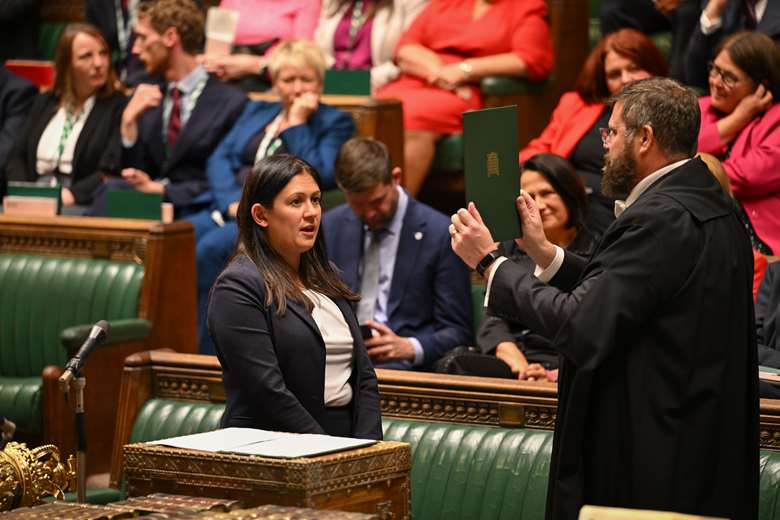The Long View | Has Britain got the culture minister it needs?
Andrew Mellor
Tuesday, August 13, 2024
In the cold corridors of Westminster, our fantasy culture minister might not be the best culture minister

So there it was. Britain got within touching distance of a culture minister who’d once been one of our own: a professional musician. Who’d have thought it? We were thinking it quite a bit, until the polls started to suggest Thangam Debonnaire would be one of the few Labour MPs unseated at the election. They were right.
It’s a shame for Debonnaire, given her amenable manner and her apparent ability to listen across tribal lines. But it needn’t be the colossal disappointment for our sector that we might presume. That’s partly because the actual culture minister, Lisa Nandy, has much to recommend her. It’s also because the new administration was never promising us much to begin with.
"Those pining for a 'cultured' culture minister should be careful what they wish for"
But it’s mostly because a culture minister who used to play the cello is not necessarily what we need. Not that Debonnaire would have been inadequate – beyond the promised inadequacy of not reversing slow financial starvation. More that artists don’t need empathy; they provide that themselves. In the Culture Ministry, we need political steel, an understanding of the technical and administrative problems we face and a belief in what we do (more on that later).
We tend to fetishize politicians who have experience of our art form and a passion for it. Fair enough. The former member for Bromley and Chislehurst, Bob Neill, fought tirelessly against Arts Council England’s vandalism in the last 18 months. It’s unlikely he’d have done the same had he been anywhere near the DCMS in an official capacity.
Those pining for a cultured culture minister should be careful what they wish for – especially when looking romantically to counterparts in Europe who take an ‘personal’ interest in their brief. Germany’s new Federal culture minister, Claudia Roth, knows enough about Wagner and Bayreuth to have stuck her oar into the festival’s programming last month, suggesting the leadership might want to break with tradition and include an opera written by someone other than Wagner. It would been laughable had she suggested Rigoletto. Instead, she pointed to Hänsel und Gretel, a work with an umbilical link to Parsifal. That made the intervention un-ignorable – a situation no artistic director needs.
"We need political steel, an understanding of the technical and administrative problems we face and a belief in what we do"
Where I live, the classical music sector knows all about this. We look back on the dark days of 2015-2019, when two very ‘interested’ culture ministers held the brief. The first wasn’t just someone you’d spot at concerts; he appeared to be at every concert (one night he was there on stage, narrating a performance of Copland’s Lincoln Portrait). Civil servants reported that his time at the ministry was a nightmare, characterised by personal whims and ‘creative’ decisions.
His successor knew enough about orchestration to ask what salaried percussionists and clarinettists were doing over Christmas while their state-funded symphony orchestras were playing Messiah. Her solution was to propose that Messiah be ring-fenced for the private sector. Like her idea to merge the radio choir with the opera chorus and move desks of strings from orchestras in Copenhagen to orchestras in the regions, it came to nothing.
Now my adopted country has a culture minister who came into office admitting his ignorance. With a business and military background and from a start-up party, he has little baggage but colossal effectiveness. He has incessantly fought the corner not just of the sector but of artists themselves, reserving arguments about economic dividends for those who only listen to money while making the broader, more fundamental case for culture’s significance to a nation’s aspirations.
All of which calls to mind a remarkable policy document written in 2004, titled Government and the Value of Culture. For a paper written by a British politician, it includes some rather northern European sentiments, such as ‘grappling with [artistic]… complexity is almost always the necessary condition of access to [an] enriching sixth sense’ and ‘complex cultural activity… is at the heart of what it means to be a fully developed human being and government should be concerned that so few aspire to it.’
The document pours scorn on the idea of justifying funding the arts in terms other than its own intrinsic value. Its author was Tessa Jowell, who for two years from 2010-12, employed one Lisa Nandy as her Parliamentary Private Secretary. Could Nandy enact such a fundamental re-think of the place of culture in Britain’s political thinking? If so, she appears to have the political experience to stand by it.



